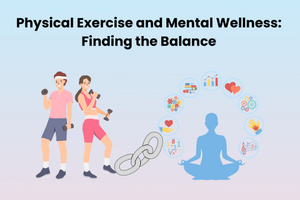
11 Jul Physical Exercise and Mental Wellness: Finding the Balance
The mental health of an individual relates to emotional, psychological, and social well-being and it has to do with how well the person can manage stress, interact with others, and make decisions. Because mental health is a dynamic state, many variables can cause it to alter over time. The connection between physical activity and mental wellness is becoming more and more prominent in society as it is difficult to keep a healthy balance between physical activity and mental health in the busy world. This blog delves into the complex connection between mental health and physical fitness, emphasising the significance of a healthy balance between both. It also explores the value of the Mental Health Course in comprehending and resolving Mental Health Issues in the framework of a comprehensive strategy.
Table Of Contents
- The Mind-Body Connection
- Stress Reduction and Cortisol Regulation
- Improved Sleep Patterns
- Enhanced Cognitive Function and Memory
- Social Interaction and Community Engagement
- The Role of Mental Health Courses
- Creating a Holistic Wellness Plan
- Individualized Approaches to Mental Wellness
- Conclusion
The Mind-Body Connection

Because of the close relationship between the mind and body, physical activity has a significant positive effect on mental health. Regular exercise releases endorphins, which are sometimes called the “feel-good” hormones. These neurotransmitters lessen the signs of stress, anxiety, and depression by acting as organic mood enhancers. Exercise improves mental health in ways that go beyond the short-term after a workout and support emotional stability over the long run.
Creating a Holistic Wellness Plan
Developing a holistic health plan entails striking a balance between mental and physical well-being. Many components of this strategy might be included, like consistent exercise, a healthy diet, enough sleep, and mindfulness exercises. By dispelling stigmas, promoting candid discussions about mental health, and enabling people to address mental health in a proactive and informed way, mental health courses support this strategy.
Stress Reduction and Cortisol Regulation
Stress cannot be separated from life, but prolonged stress can harm mental well-being. Cortisol levels, the hormone linked to stress, are released by stress and physical activity is helpful and work as a potent technique for reducing stress. Exercise, be it a vigorous workout, a yoga class, or a brisk walk, causes a physiological reaction that helps lessen the negative effects of stress on the body and mind.
Enhanced Cognitive Function and Memory
Not only is physical activity good for the body, but it also improves cognitive performance. Regular aerobic exercise has been linked to gains in executive function, memory, and attention, according to studies. Exercise enhances the health of the brain overall and encourages the creation of new neurons due to the increased blood flow to the brain. This cognitive boost is particularly important for controlling and avoiding mental health conditions like mood disorders and cognitive loss.
Social Interaction and Community Engagement
Exercise is a social activity for many people. The social aspect of exercise—whether it be team sports, walking with a companion, or group fitness classes—makes a big difference in mental health. Feelings of loneliness and isolation are major causes of mental health problems, yet human interaction is a potent remedy for them. Joining people in physical activities promotes a sense of support and camaraderie.
The Role of Mental Health Courses
A thorough grasp of mental health concerns is necessary for a holistic approach to mental health, even while physical activity is crucial for fostering mental wellness. Training in mental health equips students with the information and abilities needed to effectively identify, manage, and assist with mental health issues. These courses address a variety of subjects, such as comprehending various mental health conditions and learning self-care and support techniques for others on their mental health journey.
Improved Sleep Patterns
To promote mental health, a healthy sleep schedule is essential. Frequent physical activity has been associated with healthier sleep patterns. Exercise and sleep have a reciprocal relationship: while physical activity improves the quality of sleep, getting enough restorative sleep is necessary for both healthy physical and cognitive functioning.
Individualized Approaches to Mental Wellness
Since each person is different, what gives the best results for one person might not be appropriate for another. Understanding that mental health is a highly individualised field, mental health courses emphasise the significance of customising interventions to individual needs and preferences. This involves experimenting with different types of physical activity to identify pursuits that make people happy and satisfied, increasing the likelihood that they will adopt them into their everyday routines.
Conclusion
There is a symbiotic relationship between mental health and physical activity, with each having a significant impact on the other. Maintaining excellent mental health requires striking the correct balance as we negotiate the difficulties of modern life. Combining knowledge from mental health courses with regular physical activity offers a comprehensive approach to well-being that considers both the mental and physical facets of our existence. Having a healthy body and mind are not mutually exclusive but rather essential elements of living a happy and maintaining a balanced existence.
Join The Knowledge Academy and start your journey today!
The information on MedicalResearch.com is provided for educational purposes only, and is in no way intended to diagnose, cure, or treat any medical or other condition.
Some links may be sponsored. Products are not endorsed.
Always seek the advice of your physician or other qualified health and ask your doctor any questions you may have regarding a medical condition. In addition to all other limitations and disclaimers in this agreement, service provider and its third party providers disclaim any liability or loss in connection with the content provided on this website.
Editor’s note: If you have experienced suicidal thoughts or have lost someone to suicide and want to seek help, you can contact the Crisis Text Line by texting “START” to 741-741 or call the Suicide Prevention Lifeline at 800-273-8255.
Last Updated on July 24, 2024 by Marie Benz MD FAAD
